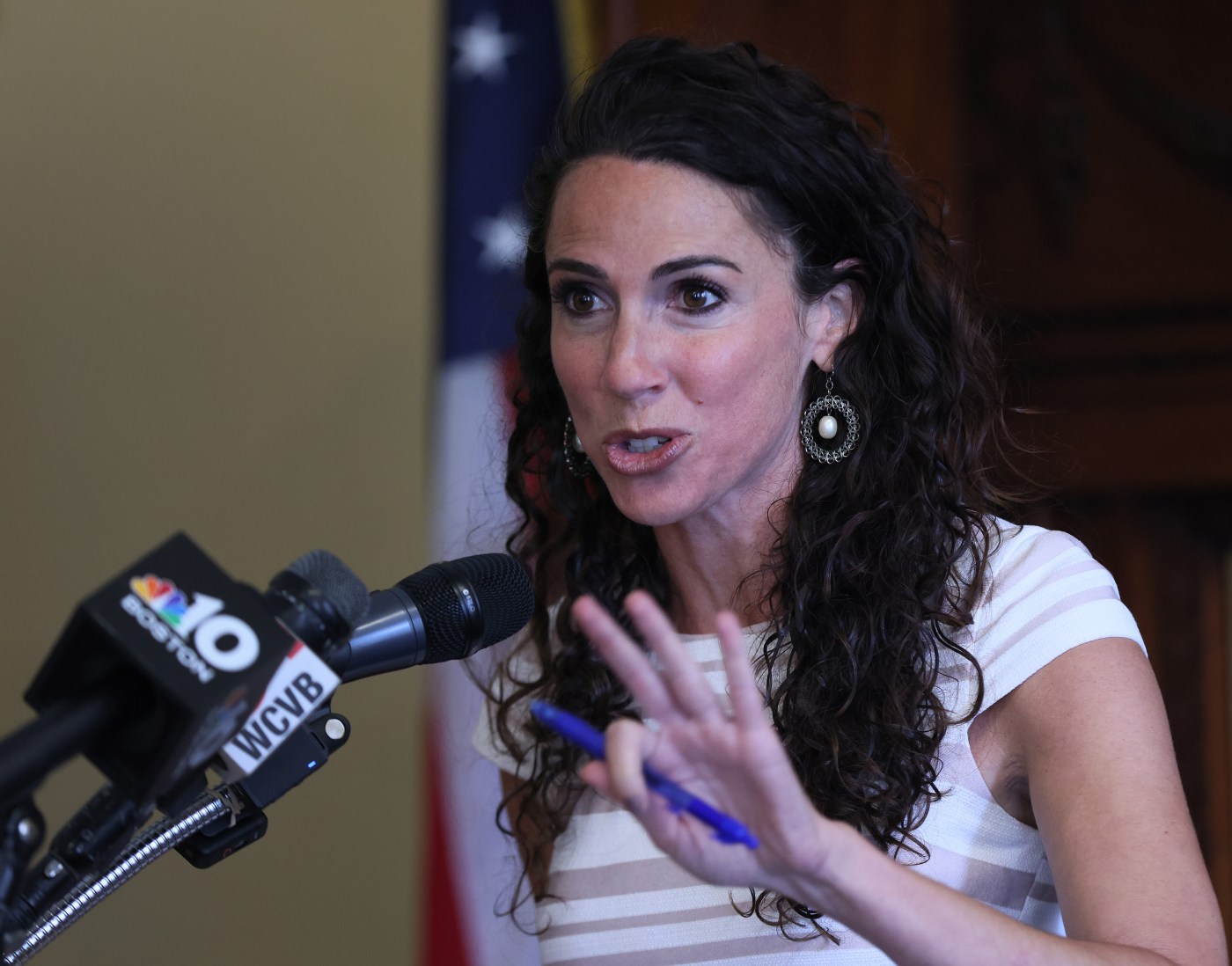
Massachusetts ballot question 1: Supporters of legislative audit policy declare victory
The Massachusetts State Auditor’s Office was set to earn the explicit authority to crack open the books of the Legislature after voters were projected to approve a ballot question championed by Diana DiZoglio, a former state lawmaker who currently holds the role.
But the approval from residents may set up a complicated path forward for DiZoglio in her efforts to audit the House and Senate, which have resisted cooperating with any investigations. The voter-approved policy could also find its way before a judge if legal challenges are brought forward.
In a statement just before midnight, DiZoglio said she believes in the power of government to “do amazing things — to make life better for everyone, everywhere.”
“Tonight’s victory is an opportunity for all of us to look forward and work to make our legislature better. The people of Massachusetts want the equity, transparency and accountability that a legislative audit would bring, not because of division or partisan lines, but because of our great potential to push forward progress together,” DiZolgio said.
Results from the Associated Press last updated at before midnight showed 61% of precincts were reporting and the “Yes” side leading with 71% of the vote.
House Speaker Ron Mariano and Senate President Karen Spilka, who have left open the possibility of tinkering with the voter-approved policy after Election Day, said they would consider next steps.
“Consistent with how the Legislature has moved forward with every voter-approved ballot question in the past, we will consider next steps regarding how to best respect the Question 1 election results in a manner that aligns with the fundamental principles of the Massachusetts Constitution, including separation of powers,” the duo said.
The ballot question drew together an unlikely coalition of advocates from across the political spectrum who have argued that Beacon Hill is opaque in its operations and deserves more scrutiny.
Critics of the measure have long questioned whether it violates separation of power principles in the state constitution, including state lawmakers who had an opportunity to take up the proposal on their own.
In a report from a legislative committee tasked with reviewing ballot questions earlier this year, legislators said the change “would undermine the well-contemplated balance of constitutional powers between the branches of government as established by the framers of the Constitution of the commonwealth.”
“What this initiative petition seeks to do, however, is to transfer, by statute, authority explicitly vested by the constitution in the legislative branch, not to the electorate, but to the executive branch thereby violating the foundational constitutional principle of separation of powers,” the report said.
Spilka and Mariano argued that the financial records of the House and Senate are available to the public on the website of the state comptroller, legislative sessions and committee hearings are live-streamed and accessible, and information about bills, amendments, roll call votes, and calendars are available online.
DiZoglio also unsuccessfully sought permission from Attorney General Andrea Campbell to take the Legislature to court over their refusal to comply with an audit of the House and Senate and as tensions mounted between the two sides.
In a letter to DiZoglio, Campbell said the State Auditor’s Office did not have the legal authority to investigate the Legislature without their consent.
That conclusion, Campbell wrote, built on advice given in 1994 when the Attorney General’s Office “expressed considerable doubt” that the auditor could crack open the books of the House and Senate over their objections.
“After a thorough review of the statutory text, pertinent Supreme Judicial Court decisions, and relevant history, we have concluded that current law does not allow an audit of the Legislature over its objection,” Campbell wrote.
That left DiZoglio pursuing a ballot question that would change state law.
DiZoglio, a former state representative and senator who regularly clashed with leadership, managed to raise more than $413,000 as of Oct. 20 in support of the measure, according to state campaign finance filings.
No formal opposition group was formed to contest the measure.
The Massachusetts Fiscal Alliance, a conservative group that backed the ballot question, said the legislative process on Beacon Hill is “completely broken.”
“Today’s victory shows that the people of Massachusetts want more transparency and accountability from their leaders in state government. These results are a repudiation of what is going on at the State House,” MassFiscal spokesman Paul Craney said in a statement.
The call on the audit question came as results were still pouring in on measures that would grant drivers for app-based companies like Uber and Lyft the right to unionize and decriminalize psychedelics for use at certain facilities.
The psychedelics question, which has drawn millions of dollars from out-of-state donors, has been pitched as a key way to help treat PTSD among veterans and mental health issues among others.
But it has drawn backlash from an opposition group that has criticized language in the question allowing for a 12-foot by 12-foot home grow area.
The rideshare drivers measure would hand local unions the opportunity to bolster their ranks in an untouched industry that has long drawn scrutiny in the Bay State for its treatment of drivers and work environment.


